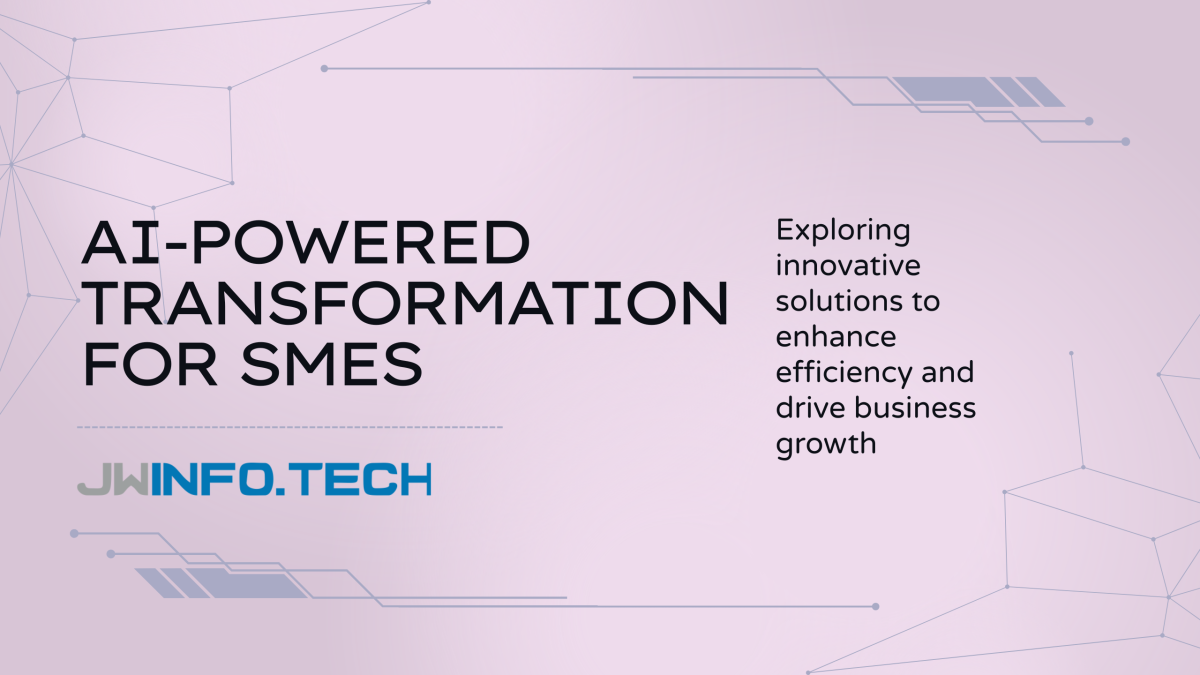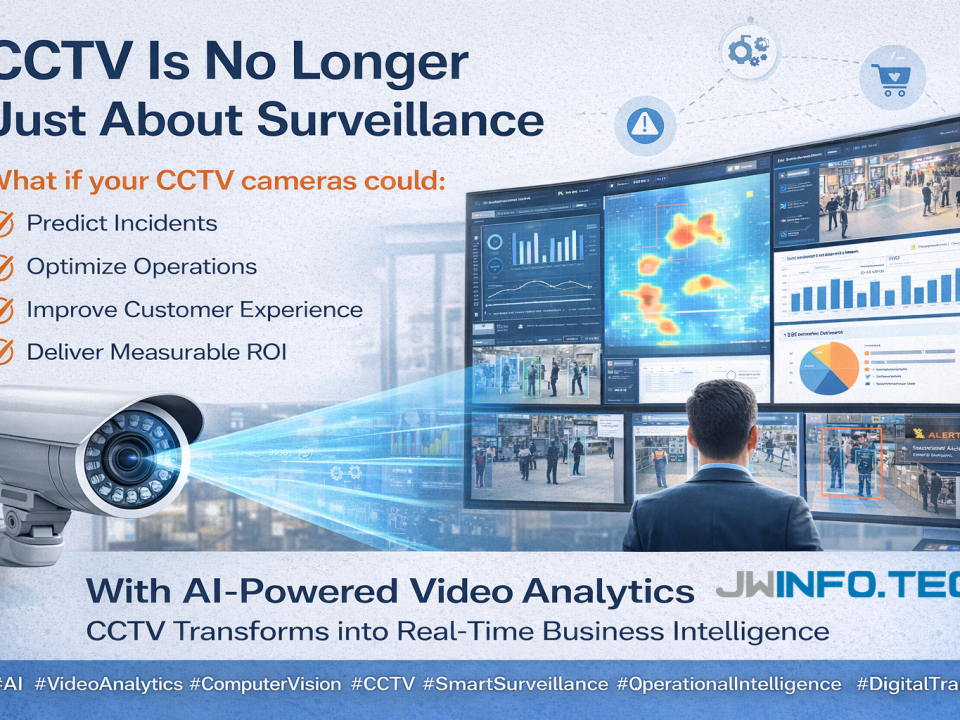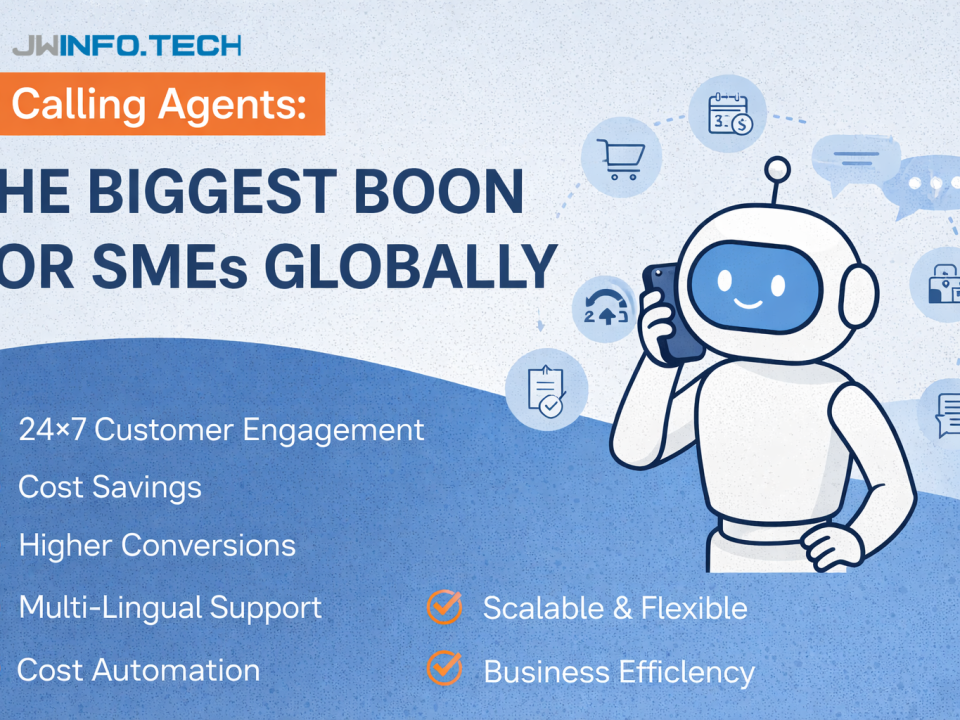Agentic AI + Voice-Enabled CRM: Transforming SME Workflows

Case Study: Revolutionizing CRM with AI Voice Cloning – A JW Infotech Innovation
September 17, 2025
Transforming SME Food & Beverage Manufacturing with AI: A JW Infotech Case Study
October 1, 2025Executive summary
SMEs need fast, practical ways to scale sales and customer support without heavy headcount increases. JW Infotech designed and delivered an agentic AI + voice-enabled CRM solution that automates customer outreach, enriches CRM records via speech-to-text, and runs semi-autonomous agents to execute routine workflows. The result: faster lead response, better personalization, and measurable gains in conversion and agent productivity—delivered with strict governance, consent and auditability.
The challenge (why SMEs struggle)
Small and medium businesses commonly face:
- Slow lead follow-up and inconsistent outreach cadence.
- High manual effort to update CRM after calls (data capture latency/errors).
- Low personalization at scale—affects conversions and repeat business.
- Limited budget for bespoke enterprise AI or complex telephony stacks.
- Concerns about compliance, privacy and ethical use of voice AI.
JW Infotech’s brief: build a practical, low-risk architecture that gives SMEs agentic AI capabilities + voice-channel automation — quickly and affordably — while protecting customer trust.
Solution overview
A modular platform combining three capabilities:
- Agentic AI Orchestration
- Lightweight agent framework that can plan, act and reflect on tasks (e.g., identify a warm lead → schedule a call → follow up if no answer).
- Human-in-the-loop escalation for intent or policy exceptions.
- Voice-enabled CRM
- Real-time voice calling infrastructure (cloud telephony), integrated with Speech-to-Text (ASR) and Natural Language Understanding (NLU).
- Automatic CRM updates from call transcripts, summary generation, and next-step action creation.
- Responsible Voice Cloning & Personalization
- Optional voice personalization for outbound messages (only after explicit consent).
- Watermarking, consent tracking, and ethical safeguards.
Key design principles: modularity, observability, governance, and low-cost entry options so SMEs can pilot quickly and scale.
Roles & responsibilities (how JW Infotech delivered)
- AI Strategist: Designed the maturity assessment and ROI model, aligned goals (e.g., conversion lift, response SLAs).
- Solution Architect: Defined the agentic workflow, telephony integration points and CRM mapping.
- ML / NLU Engineers: Built ASR/NLU pipelines and fine-tuned models for domain language.
- Voice & Telephony Engineers: Implemented call routing, IVR fallbacks, and real-time streaming connectors to CRM.
- Ethics & Compliance Lead: Implemented consent flows, logging, and governance playbooks (voice cloning rules, opt-in/out).
- DevOps: Secured CI/CD, monitoring, and disaster recovery for real-time voice systems.
- Customer Success: Onboarded teams, designed scripts, and measured KPIs.
Technical architecture (high level)
- Cloud (GCP / AWS / Azure) for compute and hosting.
- Agent Orchestration — modular agent runtime (task planner → tool executor → reflection loop).
- Telephony Layer — cloud telephony provider (webhooks + real-time media), SIP connectors for PSTN where needed.
- ASR & TTS — hybrid architecture (best-of-breed open / commercial engines) for speech-to-text and safe TTS/voice synthesis.
- LLM/NLU — for intent extraction, summarization and next-step recommendations (on-prem / private models if required).
- Vector DB / RAG — for context retrieval across CRM and knowledge base.
- CRM Integration — two-way sync for call logs, transcripts, call outcome and next actions.
- Governance & Logging — immutable audit logs, consent ledger, bias checks, and monitoring dashboards.
Implementation roadmap & timeline
- Week 0–2 — Discovery & AI Maturity Check
- Data readiness, telephony readiness, compliance checklist, KPI targets.
- Week 3–6 — PoC
- Build a single agent workflow (outbound lead follow-up), integrate telephony & CRM, test ASR/NLU for domain.
- Week 7–12 — Pilot
- Expand voice campaigns, A/B test agent scripts vs human-only outreach, handoffs to human agents, governance checks.
- Month 4–6 — Scale & Optimize
- Add more workflows, domain training, automation of CRM enrichment, monitor outcome metrics.
Typical pilot duration: 6–12 weeks to meaningful results, full scale typically 3–6 months.
Example outcomes (measurable KPIs)
Outcomes vary by sector; these are representative results JW Infotech has targeted or observed in pilots:
- Lead conversion uplift: up to 10× for high-quality warm leads when cadence + personalization improved and lead response time dropped below 2 minutes.
- Time saved per rep: 10–25 hours/month by automating CRM updates and routine outreach.
- Contact rate: 30–60% increase by optimizing reach windows and agentic retry logic.
- Data quality: 20–40% fewer manual entry errors due to automated transcript summaries and structured data extraction.
- NPS / CSAT: 10–25% improvement when voice personalization and quicker responses were applied.
Note: “Up to 10×” represents an upper-bound improvement seen in targeted scenarios where prior processes were manual and slow. Actual results depend on lead quality, script design, and data maturity.
Governance, ethics & legal safeguards
Voice and agentic AI raise special risks—JW Infotech embeds governance in every phase:
- Consent-first voice usage: explicit opt-in is recorded before any synthetic or outbound voice personalization.
- Watermarking & labeling: synthetic voice outputs include traceable markers per policy.
- Human oversight: all agentic escalations flagged and routed to humans when policy thresholds are crossed.
- Data privacy: PII handling policies, encryption in transit/at rest, role-based access control.
- Regulatory compliance: TCPA-like rules, local telephony / consent laws and Do-Not-Call lists respected.
- Monitoring & audit logs: immutable logs for every agent decision and voice call—used for QA and audit.
- Bias & safety checks: continuous regression tests to detect NLU drift and unfair behavior.
Risks & mitigations
- Hallucinations or inaccurate agent actions → mitigation: human validation gates, conservative agent action set for outbound communication.
- Misuse of voice cloning → mitigation: strict identity verification, written consent, watermarking and policy enforcement.
- Telephony deliverability & spam filters → mitigation: staggered outreach, compliant sender IDs, number reputation management.
- Operational complexity → mitigation: phased rollout, managed service model, strong monitoring dashboards.
Business model & affordability for SMEs
JW Infotech packages the solution in tiers so SMEs can adopt incrementally:
- Discovery + Maturity Check (one-time) — sets expectations and measurable goals.
- PoC bundle — limited agent + voice campaign to prove value.
- Managed service (monthly) — fully hosted, monitoring, model updates and compliance + a per-minute telephony fee.
This modular pricing keeps entry costs manageable and ties scale to realized ROI.
Real-world (composite) client scenarios
Retail D2C startup — used agentic AI to call cart abandoners with personalized voice offers. Result: faster recovery of carts, 3× increase in retained orders in pilot.
Healthcare scheduling SME — automated reminders and dynamic rescheduling via voice bot integrated with CRM; reduced no-shows by 35% and staff scheduling workload by 40%.
B2B SaaS vendor — voice-enabled follow-ups increased demo show rates and shortened sales cycles by two weeks on average.
These are anonymized, composite examples reflecting repeatable patterns.
Recommendations & success factors
- Start with a maturity check: data quality and telephony readiness are prerequisites.
- Design conservative agents first: limit outbound actions to low-risk, high-value tasks (reminders, info updates, scheduling).
- Build explicit consent flows: keep transparency and audit trails.
- Measure continuously: A/B test scripts and agent policies; calculate CPL (cost per lead) and LTV impact.
- Maintain human trust: always provide human fallback and easy opt-out.



